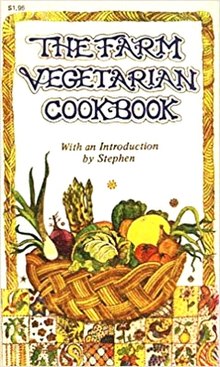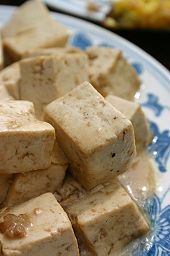 First edition First edition | |
| Author | Louise Hagler |
|---|---|
| Publisher | Book Publishing Company |
| Publication date | 1975 |
| ISBN | 0913990604 current edition |
| Followed by | The New Farm Vegetarian Cookbook |
The Farm Vegetarian Cookbook (later The New Farm Vegetarian Cookbook) is a vegan cookbook by Louise Hagler, first published in 1975. It was influential in introducing Americans to tofu, included recipes for making and using tempeh and other soy foods, and became a staple in vegetarian kitchens.
History
The Farm is an intentional community founded in 1971 in Lewis County, Tennessee. Their diet is vegan, which at the time was uncommon in the United States. UNICEF, seeing an opportunity to examine a large group all eating the same diet, sent nutritionists to the community. When the UNICEF experts checked the members' nutritional intake, they found it provided adequate protein but fell short in providing carbohydrates, fats, and calories. Recipes were developed to provide community members with guidance in following the experts' advice, and then collected to become the cookbook.
The Farm Vegetarian Cookbook was first published in 1975 by Book Publishing Company, the publishing arm of The Farm, and was a commercial success for the community. In 1978 a revised edition titled The New Farm Vegetarian Cookbook was published. In 1982 it was translated into German and published under the title Soja Total. According to its publisher it was the first completely vegan cookbook published in the United States.
Louise Hagler wrote several books on soy foods. She became a vegetarian in 1969.
Contents
The book emphasizes soy products such as soymilk, tofu, and tempeh, and gives guidelines for making them from scratch. Douglas Stevenson in The Farm Then and Now said it was one of the first cookbooks to provide "easy-to-follow, good-tasting" vegan recipes. The Farm leader Stephen Gaskin wrote in the introduction that the cookbook was not intended to be "cultish, faddish, or scare people off" but instead to educate readers and inform them that a vegetarian diet is based heavily on beans.
Impact

Academic Matthew Roth in Magic Bean:The Rise of Soy in America called it a staple in vegetarian kitchens. William Shurtleff and Akiko Aoyagi said the book played an important role in introducing soy foods and a vegan diet to Americans, made a major contribution to "westernizing recipes previously Oriental in origin", and encouraged vegetarianism not only as a diet but as a lifestyle. Vegetarian Times said it pioneered vegan nutrition and introduced America to cooking with tofu. Vegetarian historians Karen and Michael Iacobbo said it was instrumental in introducing Americans to tofu, tempeh, and textured vegetable protein in the 1970s.
Reputation
In 1990 Vegetarian Times called it a staple in vegetarian kitchens and in 1994 named it one of the five best vegan cookbooks.
Food historians William Shurtleff and Akiko Aoyagi called it pioneering and influential.
The Vegetarian Journal called it a "famous" cheese-alternative cookbook, noting its recipe for Macaroni and "Cheese" Casserole, which uses nutritional yeast as a cheese substitute.
The Fellowship for Intentional Community called it a classic.
References
- ^ Stevenson, Douglas. (2014). The Farm Then and Now: A Model for Sustainable Living. New Society Publishers. p. 92. ISBN 978-1-55092-565-4. Archived from the original on 2024-04-27. Retrieved 2019-03-14.
- "History of Tempeh". Soy Information Center. Archived from the original on 17 March 2019. Retrieved 13 March 2019.
- "The New Farm Vegetarian Cookbook". Book Publishing Company. Archived from the original on 12 October 2018. Retrieved 8 March 2019.
- ^ Shurtleff, William; Akiko Aoyagi (2017). History of Soybeans and Soyfoods in Tennessee (1854–2017): Extensively annotated Bibliography and Sourcebook. Soyinfo Center. pp. 583, 589, 634. ISBN 978-1-928914-92-1. Archived from the original on 2024-04-27. Retrieved 2019-03-03.
- Mangels, Reed; Virginia Messina; Mark Messina (2004). The Dietitian's Guide to Vegetarian Diets: Issues and Applications. Jones & Bartlett Learning. p. 453. ISBN 978-0-7637-3241-7. Archived from the original on 2024-04-27. Retrieved 2019-03-03.
- ^ Roth, Matthew. (2018). Magic Bean: The Rise of Soy in America. University Press of Kansas. ISBN 978-0-7006-2634-2. Archived from the original on 2024-04-27. Retrieved 2019-03-15.
- ^ Bloyd-Peshkin, Sharon (November 1994). "Cookbooks You Can't Live Without". Vegetarian Times. Archived from the original on 27 April 2024. Retrieved 3 March 2019.
- ^ "Down On The Farm". Vegetarian Times. December 1990. Archived from the original on 27 April 2024. Retrieved 3 March 2019.
- Iacobbo, Karen; Michael Iacobbo (2004). Vegetarian America: A History. Greenwood Publishing Group. p. 175. ISBN 978-0-275-97519-7. Archived from the original on 2024-04-27. Retrieved 2019-03-03.
- Keevican, Michael. "What's in your cheese?". Vegetarian Resource Group. Archived from the original on 18 March 2018. Retrieved 3 March 2019.
- Kanney, Kim. "6 ways to relate to your food". Fellowship for Intentional Community. Archived from the original on 26 April 2017. Retrieved 3 March 2019.